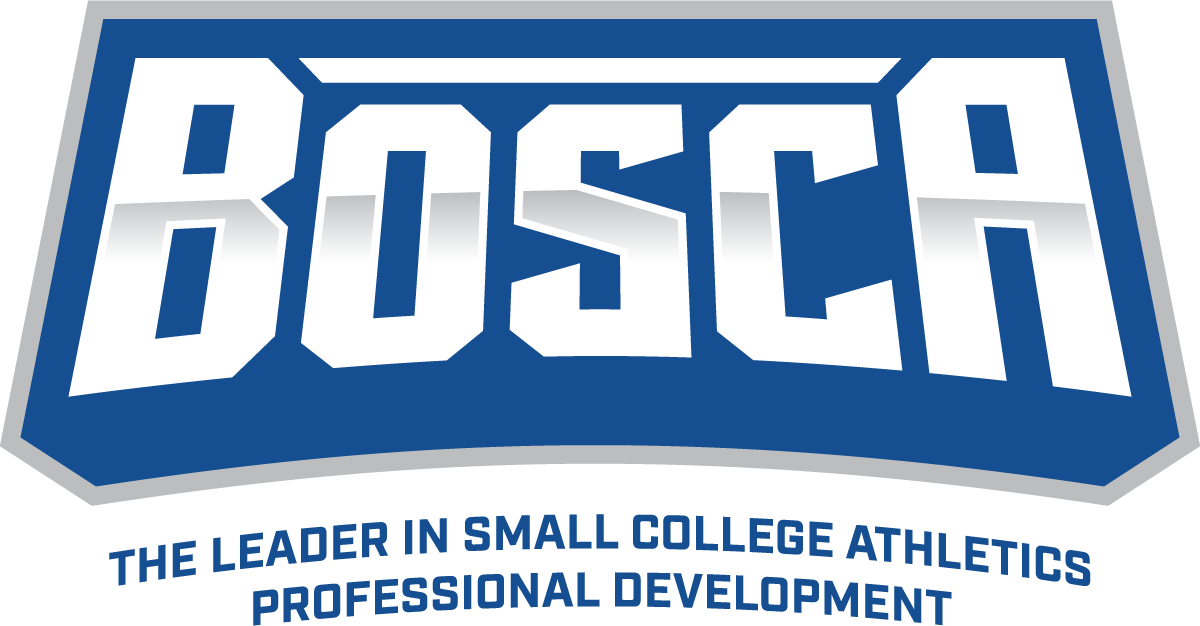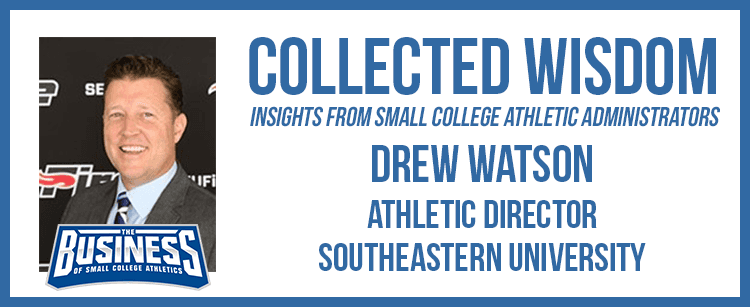Collected Wisdom - Drew Watson
Athletic Director - Southeastern University NAIA
Collected Wisdom is a series of interviews featuring insights from Small College athletic administrators around the country. Thanks to Drew Watson
, Athletic Director at Southeastern University for agreeing to participate this week.
How did you get started in College
Athletics?
As a student-athlete in college, I volunteered for the athletic department, lining fields for soccer and baseball along with other odd jobs. I ended up as the assistant men’s basketball coach, then a head women’s basketball coach, assistant athletics director, and finally the athletics director at that same school.
You started your career at Southeastern as
a Women’s Basketball coach. What led you
into the Athletic Director’s position?
When I
interviewed for the women’s basketball position at SEU, I was asked if I ever
wanted to be an AD again, since that was the position I was coming from in
Pennsylvania. I actually laughed and
emphatically stated that I wanted to coach and never again return to the AD’s
chair. A year later, the AD left and I
was named interim and eventually to the full time position, and stepped away
from coaching. God has a sense of humor,
for sure.
How do your experiences as a coach impact
the decisions you make as the A.D.?
My
experience as a coach impacts my decisions daily. Being on that side of things
for 15 years gives me an appreciation for the challenges coaches face on a
daily basis. As a result, I encourage
them to dream big and keep asking, even when the initial answer is “no.” I also know firsthand how coaching can
negatively affect a family and encourage them to make sacrifices to ensure that
area of their life is healthy.
What was the one thing you were least
prepared to do when you became an Athletic Director?
When I
became an AD in 2007, I wasn’t prepared to help the athletic department realize
its full potential because I insisted on continuing to coach. You couldn’t have convinced me of this at the
time, but I now believe that coaching holds an AD back from investing all they
can in their department. Perhaps most
consequential is that there aren’t enough hours in the day to allow an AD/coach
to fully engage in the relationships that are essential to meaningful success.
What advice do you have for
SID’s, Asst. A.D.’s that desire to someday become an Athletic Director?
Ask lots of questions, even about topics you think you already know the
answers to. The information you receive
will provide a reference point for you, even if you don’t particularly agree. Be willing to volunteer on committees and
special projects then work hard to contribute to the group. Doing so will expose you to more ideas and
broaden your perspective, which is essential to you as you develop as a
leader.
The NAIA has been exploring creating
one division for basketball and you have been a visible part of the committee
that has worked on this question. What
has that experience taught you?
The experience on the task force has reinforced in me the importance of
listening. Whether in support or
opposition, people have very passionate views on this issue. One of the things about the process of which
I am most proud, is that both the task force and the NAIA have provided an
avenue for expression of those opinions, they have been considered, and it has
led to genuine compromise.
You are an active member of the
NAIA Athletic Director’s Association.
What are the priorities for this group?
I’m relatively new in my position on the ADA board, but in my short
time there I’d say that the facilitation of communication between athletic
administrators and the COP for the betterment of the NAIA has been a priority
for the group.
Can you remember a program/idea
that you tried that just didn’t work?
When we started football I was convinced that the fan experience
merited a $20 general admission ticket price.
It seems obvious now but at the time I didn’t think about the fact that
if the ticket price is too high, the fan experience won’t matter because no one
will be there to see it. The process
reminded me to recognize that the excitement of starting a new program can cause
you to overvalue the product. As leaders
we shouldn’t allow emotions like these to distort our view of reality and lead
to unrealistic expectations.
What is your favorite part of your job?
I love what
I do so there are probably a number of answers to this question. The one that
sticks out the most is that as an AD I get to hear the struggles coaches are
going through in their season. Student-athletes that are challenging,
discipline issues, budgetary speedbumps, and everything else that they go
through. In essence, I get to see behind
the curtain. The part I love is I then
get to see the same coaches and teams who are facing challenges overcome those
things and find success as a team. It’s
never fails to inspire me.
Who are some of your
mentors/people that have encouraged you along the way?
Dr. Chris Owen, the executive vice president at SEU. From the very beginning of my time with the
Fire, Chris has always challenged me to be a leader who is “real.” “Try, fail, learn” is one of his mottos and
that philosophy has given me the margin to be creative while having the
confidence to know that failure is the genesis of learning, not the end of the
process (or my employment at Southeastern).
Best career advice that you
have received?
Learn a number of different systems and philosophies on how to
lead. When you have a wide array of
systems at hand, you will inevitably have one that fits the people on your team
perfectly and, if effectively implemented, provide you the ability to maximize
their potential for the benefit of both the team and the organization.
What advice do you have for
young people that are looking to start a career in college athletics?
Be honest. Be humble. Be kind.
Listen respectfully to those with differing opinions and be willing to
respectfully explain yours. Be willing
to admit mistakes. Don’t be outworked by
anyone. Be willing to volunteer for
camps, clinics, and service projects that you may not want to do because in
doing so you will meet people. Do these
things and your name will pop into someone’s head when they have an
opening. Continue to do them and you will
ensure you are perpetually employed.
What is the most challenging
part of your job?
Leading effectively at any level requires you to get to know what
motivates each of the members on your team.
What drives them? What is the
most effective way to coach them? What
are the issues in their past that affect their perception of leadership? Figuring those things out is by far the most
challenging part of my job because the answers to these and other questions are
different for each person. However, when I am intentional about investing time
into finding the answers, then lead people accordingly, the results are
remarkable.
What are 1-2 qualities that
you look for when hiring a head coach?
Tough to narrow this to two qualities but I would say people with a
great work ethic and a high degree of integrity in their personal and
professional lives are two vital traits I look for when hiring a coach.
How do you balance your
personal and professional life?
I have to remind myself daily that my identity shouldn’t be based on
what I do professionally. It should be based on my faith and my family. When I
keep this in mind it’s easier to shut the computer down and leave the office,
preserving some level of balance in my life.
You have attended the Business
of Small College Athletics (BOSCA) workshop in the past. What would you tell someone who was
considering attending this event?
The BOSCA workshop is a great opportunity for professional
development in a setting that is more relaxed than many of the seminars and
workshops out there which are connected with major conventions. The sessions were relevant to current issues
and the relationships I cultivated there have been instrumental in my
development as a professional.


